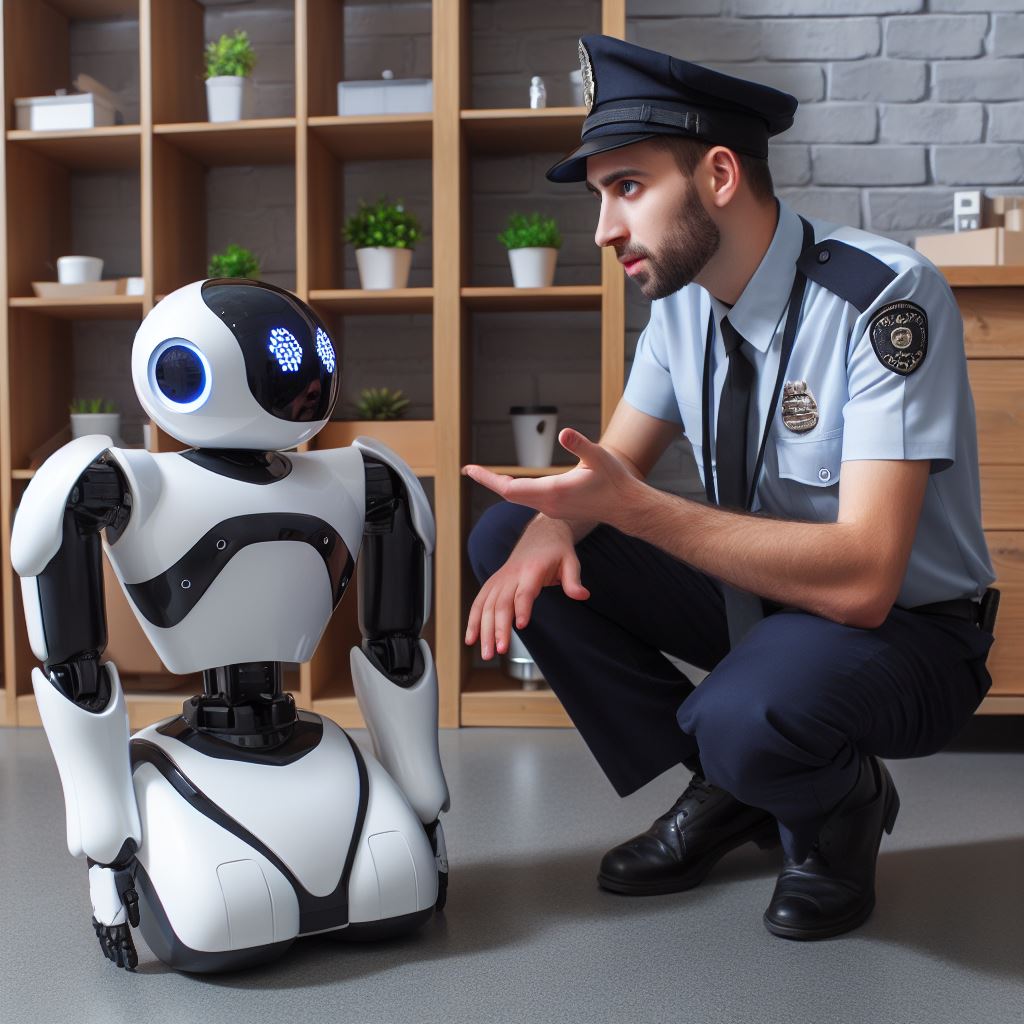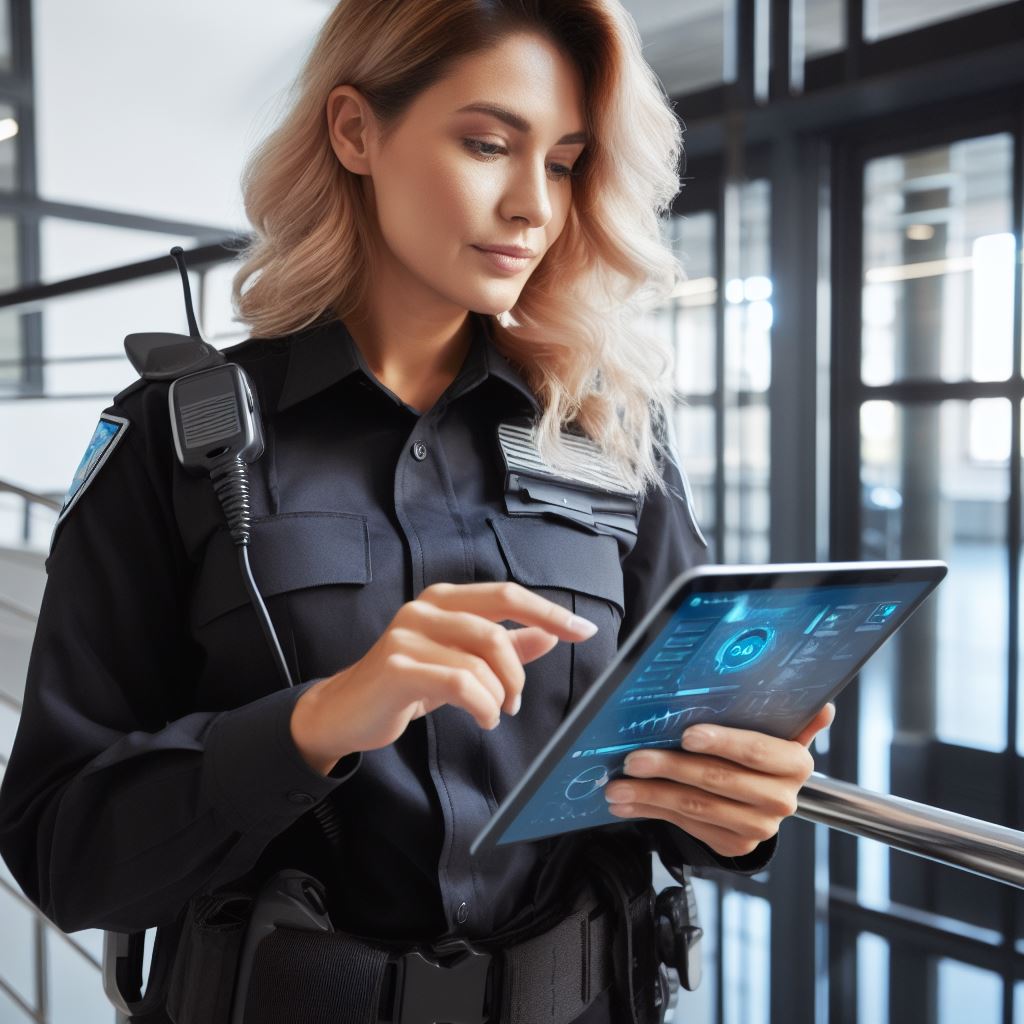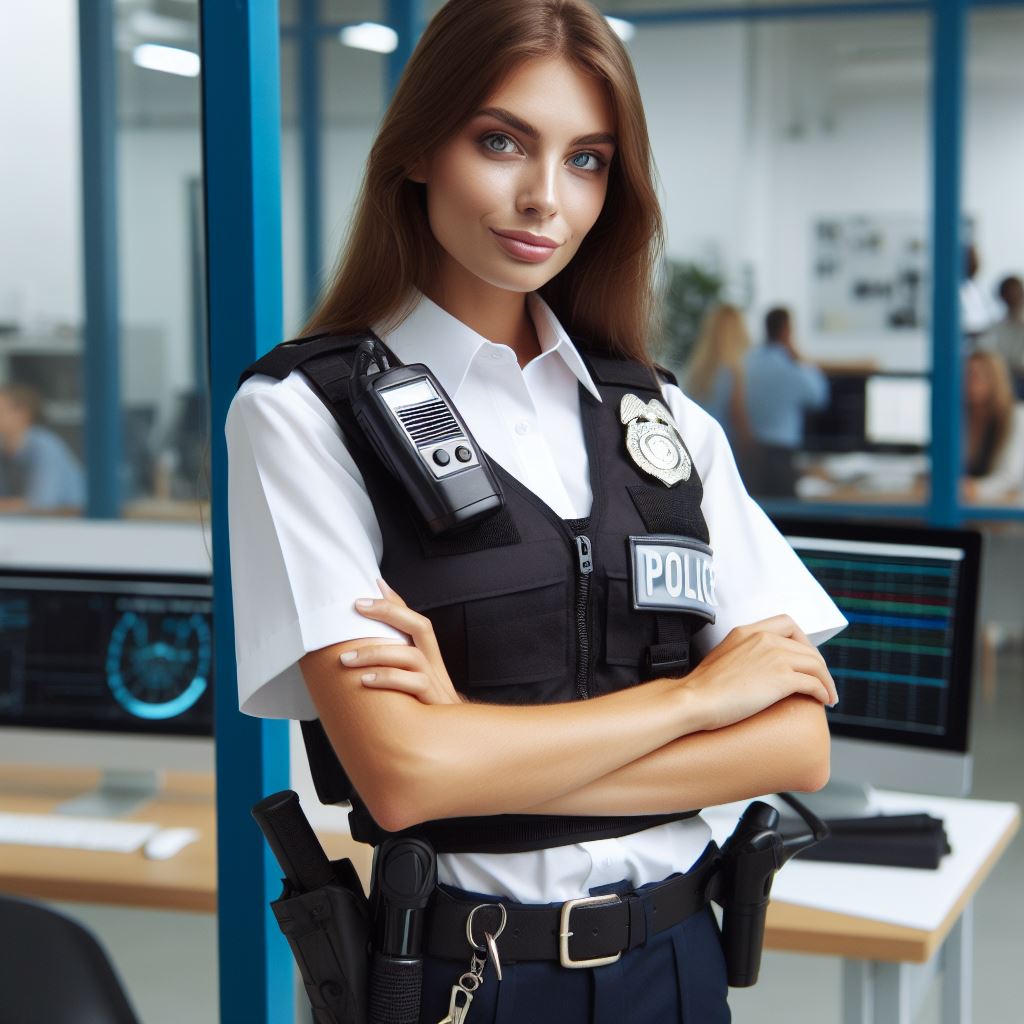Introduction
Exploring how technology is changing the role of security guards in the USA.
A. Importance of security guards in the USA
Security guards play a crucial role in ensuring the safety and protection of people, property, and assets in the United States.
They are responsible for maintaining order, preventing crimes, and responding to emergencies.
B. Advancing technology and its impact on various sectors
The rapid advancement of technology has revolutionized various sectors, including security.
From surveillance cameras to biometric scanners, technology has greatly enhanced security measures, making it more efficient and effective.
C. Thesis statement: Technology is changing the role of security guards in the USA significantly
In recent years, the integration of technology in the security industry has brought about transformative changes in the way security guards operate.
From increased automation to data analytics, technology is redefining the role of security guards and reshaping the industry as a whole.
Traditional Duties of Security Guards
A. Traditional responsibilities of security guards
Security guards have long played a crucial role in maintaining safety and security in various establishments.
These professionals are tasked with protecting people, property, and assets, ensuring a peaceful and secure environment.
However, with the rise of technology, the role of security guards has undergone significant changes.
B. Tasks performed by security guards in the past
- Patrolling assigned areas to deter potential criminal activities and address security breaches.
- Monitoring surveillance cameras and alarm systems to detect and respond to any suspicious or unauthorized activities.
- Checking identification and controlling access to restricted areas or buildings.
- Responding to emergency situations, such as fires or medical incidents, and providing appropriate assistance.
- Maintaining detailed reports of incidents, daily activities, and any notable observations.
In the past, security guards relied heavily on physical presence and interpersonal skills to ensure safety and security.
C. Need for human presence in security measures
While technology has undoubtedly revolutionized the security industry, the importance of human presence cannot be overlooked.
Although advanced surveillance systems and automated security measures are efficient, they lack the critical thinking, adaptability, and judgment capabilities that human security guards possess.
Human security guards provide a sense of reassurance and create a deterrent effect through their visible presence, which can often prevent potential criminal activities from occurring in the first place.
Moreover, security guards are skilled in responding to changing situations and handling emergencies promptly and effectively.
Despite the continuous advancements in technology, many businesses and establishments still recognize the value of security guards.
They understand that technology, while useful, cannot entirely replace the human element in security measures.
A well-trained security guard acts as a first line of defense and can adapt to various situations, using their judgment to make critical decisions.
In settings like shopping malls, airports, or event venues, security guards play essential roles in answering people’s queries, providing guidance, and maintaining order.
In essence, while technology has brought significant changes to the security industry, the traditional duties of security guards remain essential.
Their physical presence, interpersonal skills, and ability to adapt to changing circumstances are invaluable in ensuring safety and security.
As technology continues to evolve, security professionals must embrace it and learn to integrate it into their existing roles to enhance their effectiveness.
Transform Your Career Today
Unlock a personalized career strategy that drives real results. Get tailored advice and a roadmap designed just for you.
Start NowHowever, the significance of security guards as a human presence cannot be replaced, as their capabilities and contributions are indispensable in maintaining a secure environment.
Integration of Technology in Security Systems
A. Introduction to the integration of technology in the security industry
- Technology has revolutionized the security industry, transforming the role of security guards in the USA.
- Integration of technology in security systems has enhanced efficiency, accuracy, and effectiveness.
- Advancements in technology have enabled security companies to provide better protection to their clients.
B. Growing prevalence of CCTV cameras and surveillance systems
- CCTV cameras and surveillance systems have become increasingly common in public and private spaces.
- These systems enable continuous monitoring of premises, deterring criminal activities.
- Easy accessibility and affordability have contributed to the growing prevalence of CCTV cameras.
- Real-time video surveillance footage provides valuable evidence in investigating security incidents.
- CCTV cameras also help in identifying potential risks and vulnerabilities in security protocols.
C. Technological advancements used in access control and monitoring
- Biometric authentication systems, such as fingerprint and facial recognition, have enhanced access control.
- Smart card systems allow authorized individuals to gain access to restricted areas.
- Remote monitoring systems enable security guards to oversee multiple locations simultaneously.
- Internet of Things (IoT) integration allows for seamless monitoring and control of security systems.
- Machine learning algorithms can analyze data to detect anomalies and potential security threats.
D. Benefits of technology in enhancing security measures
- Technological advancements have significantly improved response times during emergencies.
- Integration of technology has reduced the need for manual security checks, saving time and resources.
- Automation of routine tasks allows security guards to focus on critical situations and proactive measures.
- Real-time alerts and notifications enable quick response to potential security breaches.
- Technology provides a deterrent effect, as potential criminals are aware of the increased surveillance.
- Remote monitoring capabilities ensure round-the-clock surveillance, minimizing security gaps.
- Comprehensive data analysis assists in identifying patterns and trends, aiding in risk mitigation.
- Integration of technology in security systems leads to more reliable and accurate documentation of incidents.
In general, the integration of technology in security systems has revolutionized the role of security guards in the USA.
The widespread use of CCTV cameras, access control systems, and monitoring technology has resulted in enhanced security measures.
The benefits of these technological advancements include improved response times, automation of routine tasks, and quick detection of potential security threats.
With the continued development of technology, the security industry is poised to further evolve and adapt to the changing needs of society.
Read: Rituals and Traditions in U.S. Firefighting Culture
Automation in Security Services
A. Explanation of the rise of automation in the security industry
- The security industry has seen a significant rise in automation in recent years.
- This trend is primarily driven by advancements in technology and the need for more efficient security measures.
- Automation allows security companies to streamline their operations and provide better services to their clients.
- With automation, tasks that were once performed manually can now be done more quickly and accurately.
- Security guards can focus on more important tasks while automated systems handle routine activities.
B. Use of robotics for patrolling and surveillance
- One of the significant applications of automation in security services is the use of robotics for patrolling and surveillance.
- Robots equipped with cameras and sensors can perform constant surveillance of an area without the need for human intervention.
- These robots can detect intruders, monitor suspicious activities, and notify security personnel in real-time.
- They can navigate through complex environments, including staircases and narrow hallways, ensuring comprehensive coverage of the premises.
- Robotic patrols offer a cost-effective solution as they can work 24/7 without requiring breaks or time off.
C. Advantages and potential challenges of using automated systems
- Using automated systems in security services brings several advantages.
- Firstly, it improves the efficiency and effectiveness of security operations.
- Automated systems can carry out tasks consistently and accurately, reducing the margin for human error.
- They can cover larger areas and provide surveillance without limitations posed by human physical capabilities.
- Furthermore, automation reduces the risk to human security personnel by handling dangerous or high-risk situations.
However, there are potential challenges associated with the use of automated systems:
- One major concern is the potential loss of jobs for security guards due to automation.
- Although automation enhances efficiency, it may lead to unemployment for some individuals in the industry.
- Another challenge is the initial investment required for implementing automated systems, which can be significant.
- Maintenance costs, software updates, and training personnel to operate and oversee the automated systems are additional expenses.
- There is also the risk of technical malfunctions or hacking attempts, which could undermine the security measures in place.
Most importantly, automation has brought significant advancements to the security industry, particularly in the areas of patrolling and surveillance.
It improves efficiency, coverage, and reduces the risks to human security personnel.
However, there are challenges such as job displacement and initial investment costs that need to be addressed.
As technology continues to evolve, security companies must find a balance between automation and human involvement to ensure optimal security services.
Read: Balancing Personal Life & Policing: Officer Stories

Enhancement of Communication and Reporting
A. Impact of technology on communication within security services
- Technology has revolutionized communication within security services, making it faster and more efficient.
- With the advent of smartphones and other digital devices, security guards can now communicate instantly.
- Real-time communication through digital platforms enables security guards to respond quickly to emergencies.
- Technology has also improved the quality of communication within security services, reducing misunderstandings.
- Security guards can now easily share information, instructions, and updates with their colleagues and superiors.
Implementing technology in communication and reporting within security services has transformed the industry.
Security guards can now communicate instantly and efficiently through the use of smartphones and other digital devices.
Real-time communication enables quick responses to emergencies, enhancing the overall effectiveness of security operations.
B. Use of digital reporting tools and mobile applications
- Digital reporting tools and mobile applications have become indispensable in the security industry.
- Security guards can now generate detailed reports using specialized software and mobile apps.
- These tools allow for the efficient documentation of incidents, observations, and patrol activities.
- By using digital reporting tools, security guards can provide accurate and comprehensive information to their clients.
- Mobile applications also enable security guards to capture and share visual evidence, such as photos and videos.
Digital reporting tools and mobile applications have also become essential in the security industry.
These tools allow security guards to generate detailed and accurate reports, documenting incidents, observations, and patrol activities.
The use of specialized software and mobile apps enables security guards to provide comprehensive information to their clients.
Additionally, mobile applications enable capturing and sharing of visual evidence, assisting with investigations.
C. Benefits of improved communication and real-time reporting in security operations
- The enhancement of communication and real-time reporting has numerous benefits in security operations.
- Instant communication allows security guards to coordinate and collaborate effectively in emergency situations.
- Real-time reporting ensures that incidents are reported promptly, allowing for swift response and resolution.
- Improved communication and reporting increase the overall efficiency and effectiveness of security services.
- Clients can have peace of mind knowing that security guards have the means to communicate and report efficiently.
- Enhanced communication also facilitates better coordination between security guards and law enforcement agencies.
- Real-time reporting provides valuable data for analysis and improvement of security protocols and procedures.
- With digital reporting tools, security companies can maintain a comprehensive record of security activities.
The benefits of improved communication and real-time reporting in security operations are significant.
Instant communication among security guards facilitates effective coordination and collaboration during emergency situations.
Real-time reporting ensures that incidents are promptly reported, leading to swift response and resolution.
Overall, enhanced communication and reporting enhance the efficiency and effectiveness of security services.
Clients can now have peace of mind, knowing that security guards have the means to communicate and report efficiently.
Furthermore, improved communication facilitates better coordination between security guards and law enforcement agencies.
Real-time reporting provides valuable data for analysis, allowing for the continuous improvement of security protocols and procedures.
With the use of digital reporting tools, security companies can maintain comprehensive records of security activities, aiding in accountability and auditing.
Generally, technology has brought about significant enhancements in communication and reporting within the security industry in the USA.
Through real-time communication and digital reporting tools, security guards are now better equipped to respond to emergencies, document incidents, and provide accurate information to clients.
The benefits of these advancements have led to improved efficiency, coordination, and effectiveness in security operations.
Read: The Relationship Between U.S. Firefighters and EMTs
Data Analysis and Predictive Security
A. How Technology has Contributed to Better Data Analysis
Technology has revolutionized the way security guards collect and analyze data.
With advanced surveillance systems, real-time data can be gathered from various sources, such as CCTV cameras, access control systems, and sensors.
This wealth of information allows security professionals to have a comprehensive view of the environment they are monitoring.
By leveraging technologies like artificial intelligence and machine learning, security personnel can analyze this data more efficiently and accurately.
These technologies help identify patterns, anomalies, and potential risks through the processing of vast amounts of information. This enables security guards to make data-driven decisions in real-time.
Moreover, technology has automated the data analysis process, saving time and resources.
In the past, security guards had to manually review hours of surveillance footage, but now, algorithms can do it much faster.
This automation allows security guards to focus their efforts on critical tasks and respond promptly to unfolding situations.
B. Utilizing Data for Predictive Security Measures
Data analysis is not only limited to understanding past events but also plays a crucial role in predicting and preventing security breaches.
Predictive security measures involve analyzing historical data to identify patterns that can indicate future threats.
This proactive approach allows security guards to preemptively address potential risks, ensuring a safer environment.
Through predictive analytics, security guards can anticipate security incidents and develop customized strategies to mitigate them.
By analyzing data related to previous incidents, security guards can identify common vulnerabilities and implement measures to prevent similar occurrences in the future.
This foresight enhances the overall security posture of an organization or public space.
C. Examples of Predictive Analytics and its Role in Anticipating Threat Scenarios
Predictive analytics has proven to be highly effective in anticipating threat scenarios and preventing security breaches.
Transform Your Career Today
Unlock a personalized career strategy that drives real results. Get tailored advice and a roadmap designed just for you.
Start NowHere are some examples of how technology-driven data analysis aids in predictive security:
- Suspicious Behavior Detection: By analyzing data from surveillance cameras, security guards can identify suspicious patterns, such as loitering or unusual movement, which may indicate potential threats.
- Social Media Monitoring: With the help of advanced algorithms, security professionals can monitor social media platforms for keywords or mentions that may indicate planned criminal activities or security breaches.
- Access Control Analytics: By analyzing data from access control systems, security guards can identify unusual access patterns, such as repeatedly accessing restricted areas, signaling potential unauthorized activities.
- Threat Modeling: Data analysis helps security guards create threat models by identifying common methods used by attackers, their motives, and historical trends.
This knowledge allows security guards to proactively design security measures to counter such threats.
Essentially, technology has significantly enhanced the role of security guards in the USA by enabling better data analysis and predictive security measures.
By leveraging real-time information and advanced technologies, security professionals can anticipate threats, prevent security breaches, and ensure a safer environment.
Data analysis, powered by technology, has become an indispensable tool in the hands of modern security guards.
Read: Surviving High-Risk Scenarios: Tips from U.S. Fire Vets
Find Out More: The Ethics of War: Decision Making in Combat Zones
Training and Skill Requirements for Security Guards
A. Introduction to the changing skill requirements for security guards
- The role of security guards has evolved significantly due to advancements in technology.
- To meet the demands of the modern-day security landscape, guards must possess specific skills.
- These changing skill requirements ensure that security guards can effectively use technology to enhance their performance.
B. Need for technical proficiency in using security technology
- Security guards now need to be technologically proficient to operate various security systems.
- They must understand the functionality of surveillance cameras, access control systems, and alarm systems.
- Technical proficiency enables security guards to respond promptly and effectively to threats and emergencies.
- With the ability to operate security technology, guards can enhance their surveillance and detection capabilities.
C. Importance of ongoing training and education
- The evolving nature of security technology necessitates ongoing training and education for security guards.
- Regular training ensures guards stay updated with the latest advancements in security technology.
- Ongoing education allows security guards to acquire new skills and reinforce existing ones.
- Continual training programs enable guards to adapt quickly to changing security threats and implement effective countermeasures.
D. Training and Skill Requirements for Security Guards
- Physical Fitness: Guards must maintain a level of physical fitness to perform their duties effectively. Regular exercise and fitness training help guards handle physically demanding situations.
- Communication Skills: Effective communication skills are crucial for security guards to convey information clearly.
Guards should be able to communicate with the public, their colleagues, and law enforcement agencies. - Observational Skills: Security guards must be observant and able to identify suspicious behavior or activities.
Developing keen observational skills enables guards to recognize potential threats before they escalate. - Emergency Response Training: Security guards should receive training in emergency response protocols. This includes evacuation procedures, first aid, and managing crisis situations.
- Access Control Management: Guards must be trained in managing access control systems, verifying credentials, and enforcing entry protocols. This skill ensures the security of restricted areas and protects against unauthorized entry.
- Surveillance Technology Operation: Security guards should have comprehensive knowledge of operating surveillance cameras and monitoring systems.
Familiarity with video analytics and data interpretation enhances their ability to detect and prevent incidents. - Alarm Systems Monitoring: Guards need to be trained in monitoring alarm systems and responding promptly to triggered alarms. They should understand the appropriate actions to take when an alarm is activated.
- Crisis Management: Security guards should undergo crisis management training to effectively handle high-stress situations.
This includes managing large crowds, providing safety instructions, and coordinating with law enforcement. - Customer Service: Guards often interact with the public, and therefore, must have customer service skills.
They should be approachable, helpful, and capable of dealing with various individuals and situations. - Legal and Ethical Training: Security guards should receive training on laws, regulations, and ethical practices relating to their roles.
Knowledge of legal boundaries ensures that guards operate within the confines of the law while protecting property and individuals.
To sum it up, the evolving role of security guards in the USA demands specific training and skill requirements.
Technical proficiency, ongoing training, and education are vital in adapting to modern security technology.
By possessing these skills, security guards can effectively contribute to maintaining safety and security in various environments.
See Related Content: Detective Associations in the USA: Networking and Support
Conclusion
A. Summary of the main points discussed in the blog post
Throughout this blog post, we have explored how technology is changing the role of security guards in the USA.
We have seen that technological advancements in the security industry are reshaping the responsibilities and capabilities of security guards.
We discussed the use of surveillance cameras, access control systems, and drones, which have allowed security guards to monitor larger areas and respond to incidents more efficiently.
Additionally, the adoption of artificial intelligence and machine learning has enhanced threat detection and improved the overall effectiveness of security operations.
B. Reflection on the positive impact of technology on the role of security guards
The integration of technology into the work of security guards has brought numerous benefits.
It has increased their ability to prevent and mitigate security breaches, reduced response times, and improved overall safety.
Advanced monitoring systems enable security guards to gather real-time information, analyze data, and make informed decisions.
This empowers them to not only identify potential threats but also to take proactive measures to maintain a secure environment.
C. Final thoughts on the importance of adapting to technological advancements in the security industry
In the end, embracing technology is crucial for security guards to adapt to the ever-evolving threats in today’s world.
As technology continues to advance, security guards must acquire the necessary skills and knowledge to effectively utilize new tools and systems.
It is imperative for security companies to invest in training programs that emphasize technology integration.
By doing so, they can ensure that security guards are well-prepared and equipped to handle emerging challenges and deliver a higher level of security to their clients.
In closing, technology is revolutionizing the role of security guards, providing them with the means to better protect people and property.
Embracing these advancements and continually adapting to new technologies will be paramount for the future success of security professionals in the USA.




